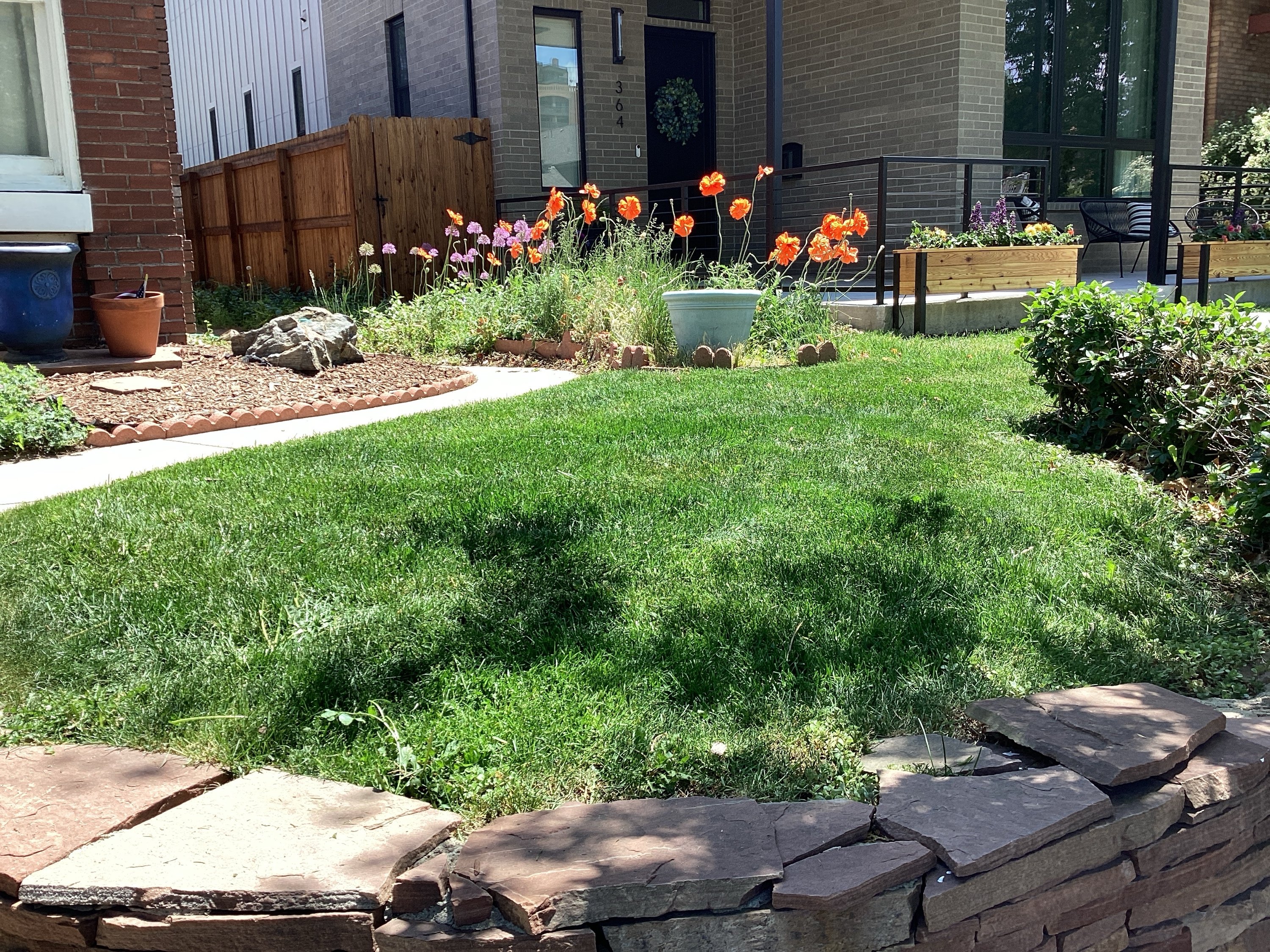Colorado Weed Control Strategies Without Harsh Chemicals

Weeds are a serious pain in the grass. But as tempting as it is to grab that bottle of chemical weed killers, don't do it. Chemical weed killers are incredibly harmful to you, your family, your pets, and the environment, especially critical pollinators like bees and butterflies. Instead, choose one of these effective, non-toxic ways to control weeds. It’s safer, cheaper, and more effective.
Why Choose Non-Toxic Weed Control?
Choosing non-toxic weed control methods is not only safer for you and your loved ones but also better for the environment. Harsh chemical weed killers can be detrimental to the soil, water sources, and local wildlife. By opting for natural weed control solutions, you're promoting a healthier, more sustainable landscape.
Non-Toxic Weed Control Strategies
1. Mulching
Mulch is your garden's best friend. There are tons of types of mulch, both organic and inorganic. Mulch works by blocking sunlight and stopping new weed seeds from sprouting. A thick layer of mulch (thickness depends on type) ensures that any breakthrough weeds are easier to remove since their roots won’t be as deep.
Types of organic mulch include:
- Wood chips
- Pine needles
- Wood mulch
Types of inorganic mulch include:
- Rocks
- Rubber mulch
- Gravel
Pros of mulch:
- Attractive
- Nutritious
- Encourages earthworms that create healthy soil
- Regulates temperature
- Retains moisture
Cons of mulch:
- Some organic mulch can be stinky
- Dyes used to color mulch (usually red or black) can stain
- Mulch can harbor pests like slugs, cutworms, and earwigs that might threaten plants
2. Hand Weeding
Weeding might be tedious – or it might just be the best free therapy you have in an increasingly chaotic world. Or consider a helping hand by requesting a quote for Detail Maintenance services with A Cut Above.
Pros of hand weeding:
- No special equipment needed, just hands
- Gets the entire weed
- Instant results
Cons of hand weeding:
- Time-consuming
- Tedious manual labor
3. Landscape Fabric
Gardeners use landscape fabric to smother weed seeds and block the sun and air they need to grow. The woven sheet of fabric is sold in long black rolls with perforated holes to let water through. Rolls are about 3 feet wide and more than 200 feet long. Cost varies depending on the brand and thickness of the landscape fabric.
Pros of landscape fabric:
- Useful for prohibiting weeds around trees and shrubs, topped with mulch
Cons of landscape fabric:
- Unattractive. The tarp appearance might make your yard look like a giant Slip N’ Slide unless hidden under landscaping rocks or mulch.
- Not recommended for vegetable gardens or annual flower beds because landscape fabric stays in place for years.
4. Everyday Household Items
There are effective homemade weed killers right in your kitchen cabinet. They’re inexpensive and effective, but be careful. They’re also non-selective, meaning they’ll kill any plant they touch, including your grass and flowers. But it also means it’s effective against many different types of weeds, including crabgrass.
Vinegar: Vinegar’s acetic acid breaks down the cell wall, dehydrating it and causing it to die.
Salt: Salt sterilizes the soil, making it difficult for weeds to grow
Dish Soap: Dish soap breaks down the plant’s cell walls, causing the plant to dehydrate.
Baking Soda: Baking soda has a high salt content, so it’ll suck the moisture out of your weeds.
Recipe: 1 gallon of white vinegar 2 cups of Epsom salt or table salt 1/4 cup of dishwashing soap Pour all ingredients into a spray bottle. Shake it up until mixed. Let it stand for two minutes, then saturate your weeds. Let everything sit for a day, then return to watch the weeds die.
Pros of everyday household items:
- Inexpensive
- Great for saturating areas like sidewalk cracks
- Easy to make with common products
Cons of everyday household items:
- Doesn’t work well in shady areas
- Requires multiple applications on weeds with longer root systems
- Some are pungent
5. Corn Gluten Meal
Corn gluten meal, a byproduct of wet grain milling, is often used to feed livestock and poultry, but it’s also an effective weed killer. It inhibits root growth, making it difficult for weeds to establish. As a bonus, it adds nitrogen to the soil. It’s best used as a pre-emergent, though, as it doesn’t kill existing weeds.
Pros of corn gluten meal:
- Won’t affect established grass
- Doesn’t affect soil
- Adds nitrogen to your lawn
Cons of corn gluten meal:
- Won’t kill established weeds
- Water reduces effectiveness
- More expensive than other methods
6. Boiling Water
If you have the time to boil water, you can create one of the most natural weed killers. You’ll kill both the weed and the taproot as the hot water drains into the soil. The water seeps into hard-to-reach areas, such as cracks in your driveway, walkway, or garden path. But be intentional with your pouring as it kills grass and flowers, too.
Pros of boiling water:
- Easy
- Inexpensive
- Non-toxic
- Immediate results
- Spares other nearby plants
- No residue
Cons of boiling water:
- It could be painful if you spill it
- Low strength, so reapplication is likely
7. Ground Covers
Ground covers are nature’s blanket. They’re soft underfoot, and most importantly, they block the sun so new weeds can’t grow. Some examples of ground covers are creeping Jenny, creeping phlox, red creeping thyme, yellow alyssum, and sedum.
Planting low-growing ground covers can save time on weeding and improve the appearance of your yard by adding color and texture. Ground covers also draw rainwater into the soil and reduce runoff.
Pros of ground covers:
- Attractive
- Low maintenance
- Adds moisture to the soil
Cons of ground covers:
- Takes time to grow and spread
8. Solarization
Solarization uses clear plastic to trap heat and cause thermal destruction via the greenhouse effect. It also holds moisture, increasing the chances that heat is carried to seeds deep in the soil. The steamy combination is lethal, and once you remove the plastic sheeting, the weeds are gone. Solarizing kills grass, soil pests, and diseases, too.
Pros of solarization:
- Covers a large area and can kill weeds deep in the soil
- Non-toxic
- No residues
- Kills soil pests, fungi, and bacteria
Cons of solarization:
- Plastic sheeting is unsightly
- Takes six weeks
- This needs to be done during hot weather
FAQs About Non-Toxic Weed Control
What’s the safest weed killer for pets? Boiling water is the safest weed killer for pets. It’s also the safest for humans (as long as you don’t burn yourself) and the environment. While all non-toxic weed killers are safe, many pets eat grass, so some non-toxic options could make them sick. But when using boiling water, you’re just adding water to your lawn. Just make sure they don’t jump on you during application.
How do you permanently stop weeds from growing in your yard? The short answer is you can’t permanently stop weeds from growing in your yard. Weeds are resilient and will always find a way. However, maintaining a healthy lawn, using mulch, and regularly weeding can significantly reduce weed growth.
Is vinegar harmful to the soil? No, vinegar is not harmful to your soil. Although vinegar contains acetic acid, giving it an acidic pH, it breaks down quickly and won’t affect your soil’s pH.
Can I use household salt to kill weeds? Yes, salt can be an effective weed killer, but it must be used carefully. Salt can sterilize the soil, making it difficult for any plants to grow, including your grass and flowers. It’s best used in areas where you don’t want any vegetation, like cracks in the driveway.
How effective is corn gluten meal in weed control? Corn gluten meal is effective as a pre-emergent weed control. It prevents weed seeds from germinating but does not kill existing weeds. It's best used as part of a comprehensive lawn care program and works well for maintaining established lawns.
Are there any natural weed killers that won’t harm my grass? Boiling water, vinegar, and household salt are all non-selective and will kill any plants they come in contact with, including grass. For spot treatments, you can try applying these solutions carefully to avoid contact with your desired plants. Hand weeding and mulching are the safest methods to protect your grass while controlling weeds.
How often should I reapply natural weed killers? Natural weed killers may require multiple applications, especially for weeds with deep root systems. For solutions like vinegar and salt, you may need to reapply every couple of weeks. Monitoring your lawn and addressing weeds as they appear will help keep them under control.
What is the best time of year to apply corn gluten meal? Corn gluten meal is most effective when applied in early spring and fall, just before weed seeds begin to germinate. In Colorado, aim for early April and early September for optimal results.
Can I use mulch year-round for weed control? Yes, mulch can be used year-round. It helps suppress weeds, retains moisture, and adds organic matter to the soil. Be sure to refresh organic mulch as it breaks down and depletes over time to maintain its effectiveness.
Is hand weeding practical for large lawns? Hand weeding can be labor-intensive, especially for large lawns. It is most practical for smaller areas or targeted weed control. For larger areas, combining hand weeding with other methods like mulching, corn gluten meal, and landscape fabric can be more effective and manageable.
Say Goodbye to Weeds – For Good!
Tired of the constant battle with stubborn weeds? Let A Cut Above Landscape take the reins! Our Detail Maintenance (TCM) service guarantees a pristine, weed-free yard, giving you more time to enjoy your outdoor space without the hassle.
Transform Your Lawn with Our Expert Services
We don’t just stop at weed control. Our comprehensive Lawn Services include overseeding, aeration, and fertilization, ensuring your lawn is not only weed-free but also lush, green, and healthy all year round. Imagine a lawn that's the envy of the neighborhood!
Why Choose Us?
- Effective Solutions: We use proven, non-toxic methods that are safe for your family, pets, and the environment.
- Expert Care: Our experienced team knows the ins and outs of Colorado landscapes and how to keep them looking their best.
- Hassle-Free: Sit back, relax, and let us do the hard work. You deserve a beautiful, weed-free lawn without lifting a finger.
Act Now for a Healthier Lawn
Don’t wait until weeds take over. Request a quote for recurring Detail Maintenance service as part of our Total Freedom - Total Care Maintenance package and take the first step towards a stunning, healthy landscape. Or you can schedule a one-off Yard Cleanup. Enjoy peace of mind knowing your lawn is in the hands of the experts at A Cut Above Landscape. Your dream lawn is just a call away! Request for a quote now!





